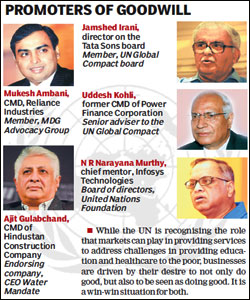Call it an Indian CEOs growing UN tribe. With the United Nations gradually viewing businesses as part of the solution rather than the problem to address issues like climate change and social development, a number of Indian CEOs are invited to occupy high chairs to lead serious non-business initiatives as well as share their experiences at important global conferences.
Reliance Industries CMD Mukesh Ambani has just been appointed to an advocacy group on UN Millennium Development Goals (MDGs), along with Bill Gates, Ted Turner and Muhammad Yunus, to focus on Goal 8 on global partnership for development. He joins the likes of Jamshed Irani, a director on the Tata Sons board, who is also a member of UN Global Compact board; Ajit Gulabchand, CMD of Hindustan Construction Company, an endorser of the CEO Water Mandate; NR Narayana Murthy, chief mentor, Infosys Technologies who is on the board of directors of the United Nations Foundation, and Uddesh Kohli, a former CMD of Power Finance Corporation, who is now a senior adviser to the UN Global Compact.
Similarly, Ajay Shriram, chairman and senior managing director of DCM Shriram Consolidated, which has interests in agribusiness and chemicals, is just back after delivering a speech at the Interactive Hearings on the MDGs at the UN General Assembly in New York. Says Shriram: “Indian companies have become more global in operations as well as aspirations. It has made CEOs more outward looking not only to take care of their business interests, but also to go beyond business to look at larger societal issues.” Saying that the UN is an obvious platform for global sharing and learning, Shriram, who is also the president of International Fertilizer Industry Association, adds that his engagement with UN was interesting because the MDG goal of poverty eradication links directly with his agricultural business.
 Agrees Pramod Chaudhari, executive chairman, Praj Industries, a biofuel solutions company: “It is essential to continue to be universally relevant as businesses assume global scale and spread.”
Agrees Pramod Chaudhari, executive chairman, Praj Industries, a biofuel solutions company: “It is essential to continue to be universally relevant as businesses assume global scale and spread.”
Says Chaudhari: “Since many companies work in areas which address issues of basic sustainability like water, energy, food and living space or ecosystem, which are interlinked to the basic tenets of UN and its affiliates, the UN presents the most credible platform for interaction and gives a world view to CEOs.” Chaudhari was face of the Indian industry at the UN Leadership Forum on Climate Change at the UN headquarters in New York and the UN Climate Change Conference in Copenhagen.
The challenge of climate change seems to have particularly ushered in the era of increased engagement between Indian businesses and the UN. Its only in keeping with the global trend where forward looking businesses have been urging the UN and political leaders to take strong measures to fight climate change. Says Kamal Meattle, CEO, Paharpur Business Centre & Software Technology Incubator Park: “The global discourse is changing. The change is going to be a threat to business as usual. The need of the hour is to convert it into an opportunity.”
Meattle was one of the 20-odd Indian CEOs at the UN Global Compact Leaders Summit 2010 in New York last month, which witnesses heightened activity by company representatives from all over the world. While Arun Maira, chairman of the Boston Consulting Group in India, who is now a member of Planning Commission, and Ashok Vemuri, an executive council member of Infosys Technologies were chosen as panel members, Jamshed Irani, a director on the Tata Sons board and Ajit Gulabchand, CMD of Hindustan Construction Company were designated plenary leaders. Gulabchand even went on to present the CEO Water Mandate, which is guidance laid down by the UN for responsible business behaviour on water public policy.
Referring to the rather large Indian CEO group, Uddesh Kohli, a former CMD of Power Finance Corporation and now a senior adviser to the UN Global Compact says: “Of late, the interest of Indian CEOs has increased in global bodies like the UN. It has got catalysed by their association with the Global Compact.” The Compact, which commits signatory companies to be in sync with its 10 principles on human rights, labour, environment and anti-corruption, lists more than 200 companies as participants.
Besides, the Global Compact has Jamshed Irani as a board member. The Compact board is appointed and headed by the UN secretary-general. Irani was preceded by B Muthuraman, now vice-chairman of Tata Steel. Another former member of the Compacts advisory council, NR Narayana Murthy, chief mentor of Infosys Technologies, is a board member of the United Nations Foundation, which was set up by Ted Turner, chairman of Turner Enterprises, to support the work of the United Nations.
Putting the trend in perspective, Jamshyd N Godrej, CMD, Godrej & Boyce Mfg, says that many Indian CEOs are deeply involved in philanthropy, corporate social responsibility (CSR) and community activities. So, increasingly, CEOs, NGOs and governments are reaching out to work with one another in order to find solutions for many difficult and intractable problems. He adds: “A business perspective and the role that markets play in providing services for basic needs such as education, healthcare and upliftment of poor is increasingly being recognised in order to find innovative solutions.” Godrej has been involved with many CII-related interventions with the UN body.
Agreeing with Godrej that the engagement of Indian businesses with the UN is only an extension of their CSR work, Nitin Desai, former UN under secretary-general adds: “It is driven by the desire to not only do good, but also to be seen as doing good. It also contributes to their image building of companies. As long as businesses are doing good, there is nothing wrong in it. It is a win-win situation for both the UN and business.”
Source: The Financial Express
Published on 22 July 2010
